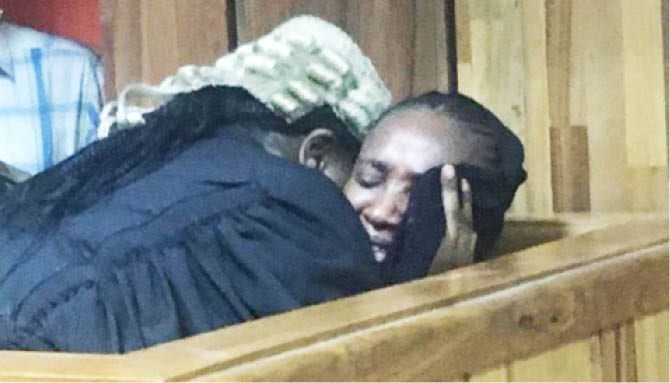The Police have urged the Court of Appeal in Abuja to uphold the death sentence imposed on Maryam Sanda by an Abuja High Court for killing her husband, Bilyaminu Bello.
In its brief of argument filed in response to the appeal by Sanda’s legal team, the police submitted that the trial court was right in finding Sanda guilty of willfully killing her husband in cold blood.
- How Maryam Sanda bagged death sentence for husband’s murder
- Has husband killer, Maryam Sanda, received Presidential pardon?
According to the police counsel, James Idachaba, the trial judge, Justice Yusuf Halilu, properly evaluated the evidence before him in reaching the decision to find Sanda guilty and impose the punishment as provided by statute.
He argued that to set aside the decision of the trial court would amount to giving an incentive to an angry and unhappy spouse to take the life of their partner at will.
Idachaba said the judgment was meant to serve as a deterrent to others who wish to commit the crime of culpable homicide, adding that a reversal of the judgment of the trial court would surely defeat the purpose of the law.
He said Sanda was guilty of taking her husband’s life and therefore deserving of the death penalty imposed on her.
He described Sanda’s appeal as baseless, frivolous and lacking in merit, praying the Court of Appeal to dismiss it with a cost.
Maryam Sanda’s conviction
Justice Halilu had on January 27, 2020, found Sanda guilty of stabbing her husband with a kitchen knife with a clear intent to kill.
The judge said he reached his verdict by relying on the compelling circumstantial evidence and testimonies of the six witnesses called by the police; the relatives of the convict who cleaned up the scene of the crime; a post-mortem examination on the deceased’s corpse; and the contradictory statements of the convict.
The judge said he also relied on the “Doctrine of the Last Scene”, which meant that the convict was under the obligation to explain what caused the death of the deceased and not the prosecution since she admitted being the last person with the deceased.
“The almighty Shisha bottle was broken and left as a smokescreen to cover the crime.
“This is an affront on the collective intelligence of everyone.
“The shisha bottle was broken after the death of the deceased.
“I am more than convinced that the defendant fatally stabbed the deceased with the same knife she threatened him with, which she has also mentioned in her statement to the police with the full knowledge that death was not just probable but certain,” the judge had held.
‘Judgment a miscarriage of justice’
However, in an appeal filed by Sanda’s lawyers, she said the judge erred in the judgement of the trial court, saying it was completely “a miscarriage of justice.”
The first of the 20 grounds of appeal pointed to an alleged failure of the trial judge to rule on her preliminary objection challenging the charge preferred against her and the jurisdiction of the court.
She said that was evidence of bias against her and a denial of her right to fair hearing as constitutionally guaranteed.
The appellant also contended among others that the trial judge erred and misdirected himself by usurping the role of the police when he assumed the duty of an Investigating Police Officer (IPO).

 Join Daily Trust WhatsApp Community For Quick Access To News and Happenings Around You.
Join Daily Trust WhatsApp Community For Quick Access To News and Happenings Around You.
